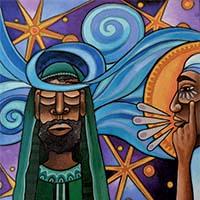John 11 is a familiar story. We hear it a lot at funerals. Lazarus, Jesus’ friend has died unexpectedly and Jesus – perhaps fearing for his own life delays in traveling to Bethany for the funeral. When he does finally arrive, Martha and then Mary come to meet him and all of those people who were there to console the sisters came with them. Jesus was their teacher, their rabbi, their friend. He was the one who they expected would make sense of all of this horrible grief that consumed them.
Martha’s
grief turns to rage and she accuses Jesus of being uncaring. Jesus, in what is for me one of the most
poignant revelations of God’s nature, is overcome by grief himself and begins
to weep. But he doesn’t make excuses for his tardiness. Instead he
turns the conversation into one that is grounded in faith. He reassures
Martha that in fact death is not the ultimate outcome of life and he gently and
lovingly recalls the mystery of his relationship with God and the hope for
salvation that comes from that mystery. And then he instructs the crowd
to roll away the stone. Once again Martha chides him. “But Lord it
has been 4 days – there will be a stench.” Jesus insists and then with
the authority of one who knows that with God there is always the opportunity
for renewal - he calls Lazarus forth out of the tomb.
It is short-sighted to see this as just a story about Lazarus coming back to life. Salvation is about transformation in this life. Transformation of self and more expansively transformation of a very broken world in this life – not salvation as preparation for the next. This lesson invites us to imagine the possibility of resurrected lives all around us – in ourselves, our families, our community and the world. Resurrection for those who desperately need it right now.
William Barclay, a 20th
century theologian from Scotland said that the miracle stories of the Bible are
symbols of what God can do today. He was severely criticized for his
expansive understanding, but it certainly resonates with me. How we live into these stories of God’s
action in our world will determine whether or not the church becomes a 21st
century prophetic voice or whether it becomes tired and obsolete and simply
fades away into oblivion. We cannot sit
back and wish that young people appreciated the music and liturgy that molded
our childhood. We who believe that with
God all things are possible, including new life from dead and buried souls,
must affirm our beliefs with our actions.
Today John invites us to stand at the tomb of Lazarus and to imagine a
possibility beyond the stench of a decaying body. To dream about the
possibilities for transformation of our lives and the lives of those around us
in unfettered and limitless dimensions. To listen for the voice of Jesus
calling us to come out of our blindness, our captivity, our lifelessness and to
experience the joy of a resurrected life.
Let us pray: Gracious and
loving God, give us ears to hear you when you call to us, eyes to imagine the
possibilities of a life lived in You, and the willingness to step up and unbind
those whom you awaken this day. Amen






